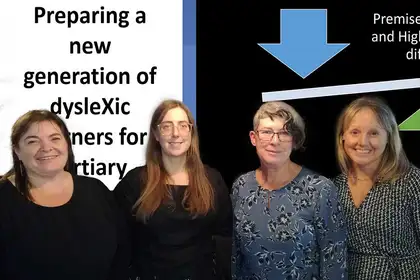
From left to right: Dr Ruth Gibbons, Ms Penny Hay, Dr Linda Rowan and Ms Nicola Macauley.
At the end of April, four Massey staff members conducted a workshop at the New Zealand Post Primary Teachers’ Association Te Wehengarua Conference in Wellington to build teacher awareness of the challenges and opportunities secondary school pupils with dyslexia would encounter in transitioning between compulsory and tertiary education.
The theme for this year’s conference was “Advancing the dream of public education”, and Massey was represented by the DysleXia Awareness Community of Practice (CoP), a cross-campus group that has been working together to raise awareness and develop resources that aim to inform and empower dyslexic students and staff in diverse ways of learning.
Their goal at the conference was to identify ways in which secondary teachers, parents and supporters could guide dyslexic learners to achieve their tertiary study dreams.
Currently, learners with dyslexia and other learning differences can face unexpected challenges in transitioning into university study as they are often unaware of the distinct features of tertiary teaching and learning environments, and how much they will need to advocate for themselves.
The DysleXia CoP comprises anthropologist Dr Ruth Gibbons, Lecturer at the School of People, Environment and Planning, Senior Tutor Nicola MacAulay of the Centre for Defence and Security Studies, University Teaching Consultant Dr Linda Rowan and Inclusive Education Adviser Penny Hay of the National Centre for Teaching and Learning.
Together, they shared knowledge from research, expertise and personal experiences as teachers and student support staff. “Research and experience tell us that successful students with dyslexia in higher education are those who have developed good advocacy skills in compulsory education and know when to approach teachers for support and more help,” they say.
They outlined the support mechanisms currently available for neuro-diverse learners, encouraging teachers to raise student awareness of the need to connect with these services at the start of their university journey. Ruth presented a range of teaching and learning approaches the secondary teachers could use now to help upskill students so that they are ready for tertiary study.
The secondary teachers were surprised to learn that the NZQA tests conducted to identify learning support and provisions for exam accommodation in compulsory education were not automatically carried into the tertiary setting. However, they felt better informed to help prepare their students for their tertiary study choices.